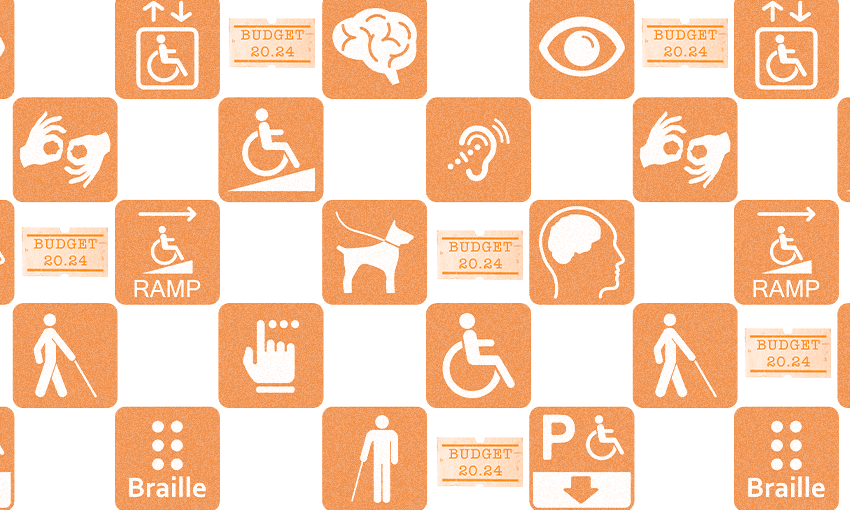The finance minister says Whaikaha is in line for a funding boost, but disabled people won’t be holding their breath, writes Robyn Hunt.
The mother of all budgets in 1991 was the last time I remember feeling pessimistic, or anything much, about a budget announcement. Disabled people are used to a small piece of the national pie.
That budget was presented by the first woman minister of finance, Ruth Richardson. Nicola Willis is the second. I hope history won’t repeat.
This budget is being released in a climate of uncertainty and confusion on several counts. Firstly, there is the critical disability support fund. Despite clarification from Whaikaha about the more restrictive rules for individualised funding, there is still a lack of clarity around how they apply to each disabled person.
This anxiety and distress is about a complex funding system, designed for disability-related support only. It may come with personal support such as helping people get up in the morning, with showering, toileting and eating, and respite support. It may provide home help so someone can live independently. Equipment services can also provide essential technology such as wheelchairs. Wheelchair funding has also been reduced.
Some disabled people are not eligible for any support from this fund or any other of the complex streams of disability funding.
The term “care” is sometimes used in a way that focuses on deficit rather than enabling or supporting. While it is appropriate for parents of disabled children and young people to have support to provide their care, many disabled adults control or want to control their own support in a more equitable and transparent system.
Support funds should enable people to make their own decisions and live the best life they can, to participate in their communities in every sense of the word “on an equal basis with others”, as the Convention on the Rights of Disabled People (CRPD) says. It’s hard to do that if the supports you need are severely restricted or denied altogether. I hope the increase in funding to Whaikaha that the finance minister has indicated will make a difference, but if it comes with too many caveats and limitations that focus on a narrow understanding of what support could and should be, it may be a backwards step.
Disabled people are also deeply upset by the government’s wish to anglicise the name of “our” ministry, fought for over decades. The name is part of that ownership. People are also anxious about the independent review of disability services, where panel members don’t have any background, in-depth knowledge of, or association with disability. The ministry may be under threat before it has a chance to prove itself is a widespread concern.
The budget announcement comes in the midst of cuts, downsizing, withdrawals and policy reversals that have a cumulative and disproportionate effect on disabled people and their families.
While MSD benefit rates, distinct from disability support services, but including the disability allowance, have increased from April 1 this year, the previous government indexed these benefits to average wage growth. Now, benefits will be indexed to the consumer price index (CPI). The Ministry of Social Development noted that this switch would disproportionately affect women, Māori, Pasifika and disabled people if no other changes were made. This could fuel inequality over time, and the extra costs of living with disability are already significant.
Public service cuts include disabled public servants, people who have critical contributions to make to the work of the public service in relation to their knowledge and experience of disability, and who may find it harder to find work in a tough labour market favouring employers.
There is a shortage of safe and accessible housing in areas where disabled people, and an increasingly ageing population, can easily access everyday services. Public and social housing stock needs to be more flexible, but not enough attention is given to good accessible design and there is no adequate modern New Zealand building access standard.
Public spaces, particularly shared spaces, are becoming more contested with mixed use, for example the potential conflict between cycle lanes and pedestrian access to shops, businesses and services. Some disabled people feel unsafe when venturing into the community.
The reinstatement of the $5 prescription charge (with exceptions for older and high-use people) will create an added burden for some. The $15 for specialist scripts remains a regular expense for many disabled people.
Recent public transport subsidy cuts for children and young people will affect families with disabled members. Another rising cost.
Other issues, such as family violence and abuse relating to disabled people, particularly women, the need for more and better paid support people, and education support for disabled children and young people also need funding.
There is hope. Disabled people are fighting back. An Aotearoa branch of the UK-based Disabled People Against the Cuts has been launched here by younger activists. There have been demonstrations in some main centres, with a planned parliament rally on May 29. An open letter has been signed by many disability organisations.
There is strong public support for reinstating the Whaikaha funding. A recent poll commissioned by Talbot Mills for the Fairer Future coalition found 66% of people support fully reinstating support and equipment funding for disabled people and carers. Majority support for reversal of the cuts came from all three government coalition party supporters.

